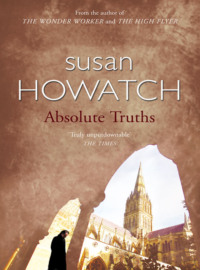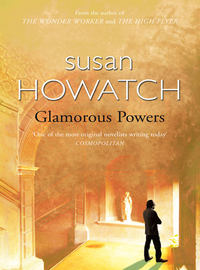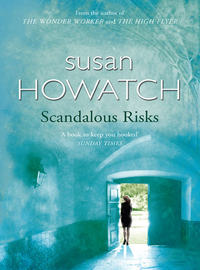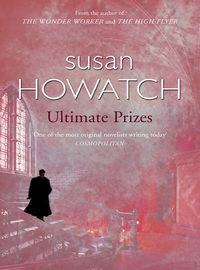
Полная версия
Mystical Paths
I rang the bell and seconds later Perry was flinging open the door. ‘Nick!’ he exclaimed, very crisp in a grey suit, white shirt and old Wykehamist tie. ‘Welcome to my orgy!’
I smiled at him warily and prowled across the threshold.
IV
There were far more people present than at Marina’s Starbridge party in May. The large drawing-room was filled with cigarette-smoke and screeching voices and raucous laughter and overdressed bodies and (from the record-player) the muffled blaring of a big band, very ’forties, very square. Funny how the vast majority of the human race has to generate a repulsive amount of noise before it can convince itself it’s having a good time.
Some sort of sea-green cocktail was circulating but I didn’t like the look of it so I asked for a Coke. No luck. I settled for a glass of Rose’s lime juice which Perry produced for me from his kitchen. The trouble with alcohol is that it tastes so disgusting, and if you start mixing lime juice with, for example, gin, the result always seems to me to be an affront to the taste-buds. Someone offered me a cigarette but I waved it away. I’ve never been able to see the point of smoking. It smells vile and all that ash makes such a mess. If you’ve got to do something with your mouth and hands between meals, why not sip Coke and chew gum? American civilisation could be pretty weird – all those obese cars – but some of the basic innovations, such as Coke and gum, were genuinely useful … Or so it seemed to me at the age of twenty.
Marina pounced on me within seconds. (‘Nicky darling, heavenly to see you!’) She was wearing a silvery cylinder squashed in the right places to show off her Venus de Milo figure. Her friends Emma-Louise and Holly also pounced. (‘Nicky – super? one shrieked, and: ‘We’ve won our bet that you’d be wearing jeans – even to an orgy at Albany!’ screamed the other.) But there was no sign of my friend Venetia. I was told she was too busy preparing for her wedding. I was just sighing with regret when Dinkie undulated by, entwined with Michael, and gave me a wink as she passed. This enthralled me. I spent some time wondering whether I should have winked back, but I wouldn’t have wanted to offend Michael. Finally Perry ended my reverie by musing to me: ‘Christian and Katie are late – stuck in a traffic jam somewhere, I suppose,’ and I heard myself utter the non sequitur: ‘You never mentioned that you knew my brother Martin.’
‘Something told me,’ said Perry, ‘that you got very, very tired of people droning on about your brother,’ and suddenly I decided to like him.
I said: ‘Do you go to the theatre a lot?’
‘All the time, yes, I’m an addict. Look, come and meet some of my thespian friends …’
I met his thespian friends of both sexes. Perry never mentioned my connection with Martin, but Katie’s brother Simon, a pea-brained product of Eton, eventually let the cat out of the bag and then all the thespians started to gush over me with the result that the party became tedious. I took refuge in the lavatory. Venturing out at last with reluctance I found myself overpowered by the desire for more lime juice but before retiring to the kitchen to find the bottle I moseyed around, putting my nose in the dining-room where a buffet was laid out, casting an eye on Perry’s bedroom where a single bed added weight to the theory that he was undersexed, and taking a peek at the adjoining bathroom where I found a peculiar Picasso-style drawing of a mermaid.
Having noted the complete absence of any item which would have indicated homosexual leanings, I beetled down some stairs into the basement kitchen and came to a halt, mouth gaping and eyes wide, at the splendid sight which confronted me. The kitchen was a historical masterpiece, untouched by the mid-twentieth-century mania for making kitchens look like poor relations of the morgue. I saw a large wooden table, very handsome, a gas stove which could only have been pre-war, and a distinguished porcelain sink. The old range had been left in place for its ornamental value, and beside it there was even a set of brass fire-irons: poker, tongs, shovel and soot-brush. Amazing! Anyone who lived in 1963 and kept fire-irons in his kitchen had to be exceptional, and I saw clearly then that Perry was no run-of-the-mill theatrical hanger-on with homosexual leanings but a highly original celibate who spoke Russian, lived in a palace, devoted his free time to civilised cultural pursuits – and kept Rose’s lime juice in some corner I now had to find.
I opened the door of a gas – gas! – refrigerator that had to be at least thirty years old but no bottle of lime juice stood keeping cool on the shelves. Instead I found caviar from Fortnum’s, a bottle of champagne, half a Melton Mowbray pie and a jar of olives. By this time I was beginning to think that all the kitchen lacked was one of the old-style butlers, complete with white hair, a stoop and corns.
I prowled on, pausing at an antique cupboard which housed some very grand china, and reached a door set in the wall near the back entrance – the tradesmen’s entrance, as it would have been in the old days. Opening the door I discovered a coal-cellar – a coal-cellar! Within spitting distance of Piccadilly! – and inside this astonishing relic of a vanished past was a large load of coal. Surreal. What kind of man kept a cellar full of coal in a designated smokeless zone? A man of infinite wit and style. I decided Perry was probably the one man in England who was worthy of being Christian’s best friend.
But still no Rose’s lime juice. Abandoning the coal-cellar I opened yet another mysterious door and found a larder complete with a cooked pheasant sitting on a plate and a tub of Stilton exuding its famous pong. Nearby I spotted pâté de foie gras, Gentleman’s Relish and – yes, Rose’s lime juice. Grabbing the bottle I helped myself to a spare sliver of Stilton before moving to the table to replenish my glass.
Perry clattered down the stairs just as I was diluting the juice with water. He had an empty jug in his hands and Christian at his heels. ‘… playing with fire,’ he was saying as I tuned in to the conversation in mid-sentence. ‘Marina may be all talk and no action, but –’ He saw me and broke off.
‘Nick!’ exclaimed Christian in delight.
‘Hi!’ I said pleased.
‘Sorry, Nick – I’ve been neglecting you,’ said Perry, setting down the jug on the table and extracting some ice from the bag in the refrigerator. ‘Glad you found the lime juice. Would you like to see my coal-cellar?’
‘It’s a land-mark,’ said Christian, preparing to exhibit it to me. ‘The last full coal-cellar left in London. He shows it to everyone.’
‘Groovy,’ I said, feigning ignorance of the phenomenon and taking a peek. ‘But why all the coal?’
‘I made a mistake with the coal-merchant just before the smokeless zone was declared. Pass that bottle of gin, would you, Christian?’
The doorbell rang in the distance.
‘You answer that,’ said Christian to him. ‘I’ll mix the jungle juice.’
‘It’s probably my neighbours complaining about the noise …’ He clattered back upstairs.
‘How are things going?’ said Christian agreeably to me as he poured a huge slug of gin into the jug.
‘Okay.’ Awkwardly I edged closer to him. ‘Sorry about my father,’ I said, ‘I really busted a gut trying to get him to see you. I hope you didn’t feel I’d let you down.’
‘Of course I didn’t!’ He gave me his warmest smile. ‘He wrote a most helpful letter, so you needn’t think you pleaded my cause in vain … All set for your final year at Cambridge?’
‘Yep.’ I watched with amazement as he added liquid from three other bottles to the gin in the jug and then topped off the poison with Schweppes bitter lemon.
‘I suppose you haven’t been seduced since I last saw you by the current fashion among undergraduates for travelling around America once their finals are finished? I’m told that travel on a Greyhound bus is guaranteed to broaden the mind.’
‘Yeah?’
‘Sounds a bit tame, if you ask me, but then I speak as someone who did two years’ National Service in the army. Now, there was an experience that broadened the mind! I enjoyed that escape into a different world.’
I had never before thought of National Service in a positive light. I had just assumed it would be boring and I had heaved a sigh of relief when it had been abolished, but the word ‘escape’ in Christian’s last sentence was now reverberating compellingly in my mind. I heard myself say: ‘I wouldn’t mind getting away for a while. But my father would worry about me if I went off into the blue on my own, and I’d worry if I knew he was worrying.’
‘Obviously in that case the travel would need to be structured in some way which would win his approval and enable him to relax. How about doing voluntary work overseas for a Christian organisation? You’d be in the company of responsible people, and he’d recognise the work as useful experience for someone who planned to be a clergyman.’
This struck me as such a brilliant suggestion that for a moment I was speechless with excitement. A vision of change blazed through my psyche. No more living with the Community and enduring their prim piety. No more feeling tethered to Starrington Manor. I could take two years off, just as if I were doing National Service, and work for a Christian organisation in … The word ‘Africa’ floated across my mind. Exotic, exciting Africa which I had longed to visit ever since I had seen Stewart Granger in King Solomon’s Mines. Distant Africa, where no one would have heard of Jonathan Darrow, the famous spiritual director, and Martin Darrow, the famous actor. Africa, Africa, Africa … I could almost hear the drums beating to lure me on my way.
‘That’s cool,’ I said to Christian. ‘A great suggestion. Thanks.’
He finished stirring the new batch of sea-green poison and smiled at me. Then he said idly: ‘Beware of getting too tied up with that father of yours. Are you sure you really want to be a clergyman?’
Instantly the Dark began to creep into the room. It appeared stealthily, eerily, billowing around Christian so that he became a shadowed figure, sinister and subversive, a skeleton cloaked in black, a nightmare from some medieval vision in which ‘The Dark’ appeared not as a poisonous cloud but as a horned creature bent on destruction. I saw no horned creature but I felt that poisonous cloud, and as soon as I felt it I knew what it was, I just knew, I experienced ‘gnosis’, the knowledge that was special.
I stood facing Christian across the kitchen table while the party roared above us, and as the moment of ‘gnosis’ hit me I knew there was something very wrong with him, I knew that his psyche was far out of alignment, utterly dislocated, and that the Dark was streaming into him through every fissure of his personality. Yet never had Christian seemed kinder to the man so many years his junior, and never had his words seemed more charming and benign.
The Dark was now a huge pressure on my psyche and I knew I had to blast myself free. ‘Yes, I do want to be a priest,’ I said. ‘I want to serve Jesus Christ –’ Instantly the pressure eased as I opened up the scene to the Light ‘– and nothing on this earth is going to stop me.’
‘Well done!’ said Christian at once without a trace of condescension. Moving away from me with the jug of poison in his hands, he began to mount the stairs. ‘In that case I can only wish you the best of luck and every success in the Church.’
In silence I followed him upstairs, the glass of lime juice still clutched in my sweating palm.
V
‘I’m not at all sure you’ve got this right,’ said my father when I returned home and confided in him. Any manifestation of the Dark was always so horrifying, reeking as it did of death and disintegration, that my strongest instinct was still to seek sanctuary in his cottage, and as usual in such circumstances my father moved to reassure me by speaking very calmly. ‘I’m not at all sure you’ve got this right …’ He often said that, but now I found the words not soothing but irritating. I didn’t want my judgement queried. I knew what had happened. Having recognised that the Devil was infiltrating Christian I wanted to know how to deal with this knowledge. How could I get Christian to an exorcist? How could I dare to face him in future? How could I be sure that the Devil wouldn’t send a demon to infest me as the result of the scene in the kitchen when I’d defied him by declaiming the name – and thus invoking the power – of Christ? (I should perhaps apologise at this point for using old-fashioned picture-language, but some realities are almost impossible to express verbally without the liberal use of symbols.) All these questions seemed to me to be very urgent, yet as far as I could see my father was far from brimming over with the desire to answer them.
‘Father, it’s no use you saying: “I’m not at all sure you’ve got this right.” I know I’ve got it right, I know I have –’
‘You “know” no such thing! You’ve just jumped to a conclusion. Do please try not to be so arrogant, Nicholas!’
‘I’m not being arrogant!’
The generation gap began to yawn between us again.
‘Can we both make an effort to keep calm?’ said my father. ‘If we start upsetting each other we’ll get nowhere. Now let’s review your story carefully. You say that the Devil was infiltrating Christian – or perhaps you would be using the traditional language more accurately if you said that Christian was being attacked by demons who were paving the way for their master to take possession of his soul. Very well. But this is a big claim to make and it would be wise to proceed with considerable caution before reaching such a diagnosis. Remember that the gift for recognising the presence of either God or the Devil – the charism of the discernment of spirits – is seldom granted to someone of limited spiritual experience.’
Obstinate old fogey. I tried to be patient. ‘But I can pick up the vibes in my psyche and then I know, it’s “gnosis”.’
My father began to get upset again. ‘That’s a delusion. That’s the Gnostic heresy in its most insidious form – the belief that you’re one of an elite which has special access to God and special knowledge of spiritual mysteries. You’re confusing psychic power with spiritual power, Nicholas, but it’s quite possible to be psychically strong yet spiritually weak. Psychic powers must always be the servant of the personality, never the master, and all such powers should be offered with humility to God, not flaunted to boost one’s self-esteem.’
‘I know all that, Father –’
‘You’re not behaving as if you know. You’re being very proud and wilful, Nicholas.’
Wilful! Another of those awful Victorian adjectives. I wanted to bang my head against the wall in exasperation. ‘Okay, okay, okay!’ Mustn’t upset the old boy. He might die. Taking a deep breath I grasped my knees so tightly that my knuckles ached and said in my most soothing voice: ‘You tell me what really happened during that scene with Christian.’
My father sulked for a moment but then said evenly enough: ‘First of all I would survey the background, and the first fact I notice is that he’s taking an interest in you. Why? Possibly it’s because as an Oxford don he deals with many young men of your age and he’s intrigued because you’re unusual. This is the most obvious explanation, although one could be more cynical and theorise that he wanted to see me and realised that cultivating you was the best way of getting what he wanted. Perhaps originally both explanations were true. Now, this second reason for his interest might be classified as self-centred, even ruthless, but I certainly wouldn’t call it demonic, and since he’s still willing to be friendly to you even though I’ve refused to see him, his interest at present would appear to be wholly benign.’
‘Yes, but –’
‘Wait. Let’s take this one step at a time. The next thing I notice is that he makes a most interesting suggestion: he proposes that you should do the Christian equivalent of National Service before you proceed to theological college. If you did want to do this, I must tell you that I certainly shouldn’t oppose it. I firmly believe that the more experience young priests have of the world the better, and I often think, looking back, that I was ordained too young. Of course I should miss you dreadfully if you were away for a long time, but that’s irrelevant. It would be very wrong indeed if I selfishly kept you hanging around here with the result that your growth to maturity was impeded. You’re got your own life to live. You must live it.
‘Very well – where have we got to? We seem to have concluded that Christian’s behaviour towards you has been not only genuinely friendly but unexpectedly helpful. But then we come to his final question: “Are you sure you really want to be a clergyman?” and immediately your psyche soars on to a very odd plane indeed. But why? This is a good question of Christian’s and one which you should, in fact, be periodically asked.’
‘But Father –’
‘Sometimes when a young man chooses to follow in his father’s footsteps, it’s a way of evading the difficult task of deciding what he’s really called to do, and I for one don’t want you falling into that particular trap. We’re not all called to serve God as priests and I fully accept the possibility that He may wish you to serve Him in some other way.’
‘But if I’ve been designed by God to be specially like you –’
‘He may still call you to serve Him in a different field. Of course it’s very gratifying to me that you want to be ordained but you don’t exist to ensure my selfish desire for gratification. You’re here to serve God, not your father.’
Nowadays my father regularly felt compelled to deny his desire for a replica, but since I had long since decided this denial was a mere formula to soothe his conscience, I never took the slightest notice. ‘So what you’re really saying,’ I said after he had finished his new attempt to brainwash himself, ‘is that Christian was sanity personified and I reacted like a lunatic.’
‘Not like a lunatic – that seems a little harsh! – but I see no sign of the demonic in this conversation, and I’m wondering if you projected on to Christian a particularly oppressive anxiety which you normally keep buried deep in your unconscious mind. Maybe you should interpret the scene not as a demonic manifestation – and certainly not as a sign that Christian was being infiltrated by the Devil – but as a hint from God that you should re-examine your call to be a priest.’
‘But that’s all –’ I bit back the word ‘balls’. If there was one certainty in my life, it was my call to the priesthood. I had wanted to be a priest ever since I had learnt in my early childhood about Jesus the healer and the exorcist, the hero who always triumphed over the Dark.
Making a new effort to hold on to my patience I said to my father: ‘Your explanation’s so far from what I actually experienced. I know the Dark was there, billowing around Christian and seeping into him through all the cracks in his personality, so your whole interpretation of the scene falls as flat as a pancake.’
My father then became very angry. ‘You understand nothing,’ he said. ‘Nothing. And what’s worse, you don’t want to understand, you refuse to be taught, your pride’s convinced you that you know everything there is to know. But I tell you, Nicholas, that if Father Darcy were present in this room –’
I somehow managed to stifle a groan. It really was awful how old people repeated themselves. Cuthbert Darcy, who had once been the Abbot-General of the Fordite monks, was my father’s hero. In fact I had been brought up on the extraordinary memories Father Darcy had left behind him. My father would reminisce about this peculiar old cove at the drop of a hat. Sometimes I felt I had heard each Darcy story at least twenty times.
‘But Father Darcy isn’t present in this room,’ I said. ‘Father Darcy’s been dead for over twenty years.’
‘More’s the pity – if only he could be here to train you as he trained me! Psychics have to be trained. When I think of the appalling messes I got into before I met him – and I didn’t meet him until I became a monk at the age of forty-three –’
‘I know, Father, I know, you’ve told me a million times –’
‘Then you’ll understand why I pray constantly that you’ll meet your own version of Father Darcy very soon – and sometimes when I pray I feel he’s quite close – or is it that he will be quite close? I’m not sure, but what I know for certain is that Aelred Peters is no longer right for you and you’ve got to have someone much tougher.’
‘But I like Father Peters! We get on.’
‘You mean you’ve reached the age when you can manipulate him. You need someone very strong, Nicholas, strong psychically and strong spiritually. Father Darcy …’
The reminiscences began. I stifled another groan.
‘… and he had the toughest psyche I ever encountered, strong as steel yet so extraordinarily flexible – like a magic rope his psyche was, I can see it quite distinctly in my mind’s eye even now after all these years – forty years it is since I met him, imagine that! What a priest he was, so perfectly trained and disciplined, his psychic powers so striking yet so wholly under control, so entirely devoted to God’s service – oh, I can see that first meeting of ours in 1923 as clearly as if it were yesterday …’
I picked up Whitby who had wandered over as if to sympathise with me. Lucky old cat, unable to understand my father’s monologues.
‘… and there I was, six foot three, and there was he, no more than five foot nine, but within seconds I felt like a dwarf and he seemed seven foot tall. And all he did was look at me. He had very dark eyes, rather sunken, set in shadowed sockets …’
My father droned on but I switched off. The truth was that Cuthbert Darcy had been a monastic thug. Their first meeting had resulted in the thug beating him up. I never pretended to understand any of it. After that they had enjoyed a love-hate, father-son relationship for seventeen years even though they had never lived beneath the same roof. (My father denied any father-son relationship, of course, since this type of attachment was forbidden in the cloister, but it was obvious to me that Darcy had had all the spiritual glamour and psychic understanding which my Grandfather Darrow had lacked.) My father had spent some years at Ruydale, the Fordites’ estate in Yorkshire, before he was appointed Abbot of the Grantchester house near Cambridge, and throughout this time Father Darcy had remained at the Fordite headquarters in London, the tarantula at the centre of the web. In consequence the two men had seldom seen each other. Initially they had met once a year, when the Abbot-General made his annual visitation. Later they had met twice a year, once during the visitation and once six months afterwards when my father was summoned to London for what was described as a ‘spiritual spring-cleaning’. But despite the rarity of the meetings there had been copious correspondence. Apparently the strong psychic affinity between the two men had generated an interest powerful enough to overcome their temperamental incompatibility.
This exceedingly weird relationship should have served as a text-book example of how not to conduct an association arising from spiritual direction, but my father always said that Darcy had been the one spiritual director who had succeeded in keeping him on the rails. Indeed my father in old age was lyrical on the subject, and the saga of how the renegade psychic had been rescued, dusted down, shaken up, taught, trained and saved had now acquired the golden sheen of heroic legend. The darker side of this off-beat monastic pas de deux – all the bouts of unChristian dislike, anger and truly scandalous violence – had long since faded away, obliterated by the rosy glow of my father’s unflagging nostalgia.







